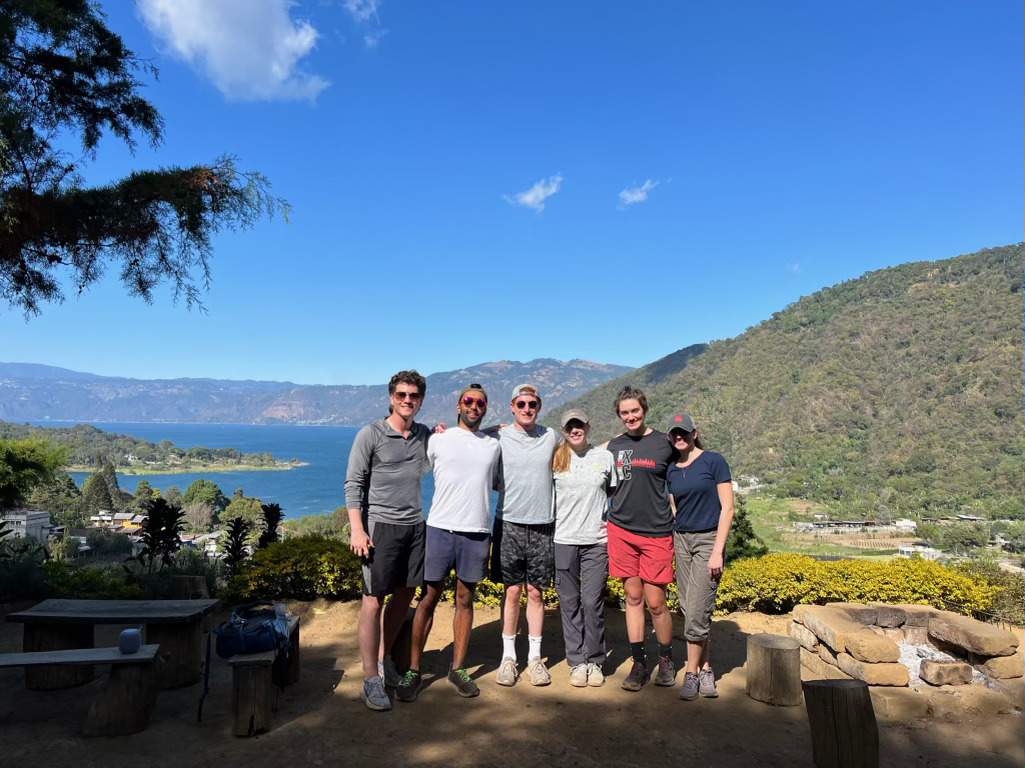Rhodes Funded Group Trip to Guatemala
The generosity of communities and making personal connections left an impression on Cornell Tradition Fellows who participated in a winter service trip together. Ross Halpern, ’23; Shilvaan Patel, ’24; Sebastian Contreras, ’24; and Catie Kopp, ’23 are members of the program’s Student Advisory Committee (SAC), and they had the opportunity to travel together, engaging in a culturally immersive volunteer experience and developing a sense of comradery with the individuals that they interacted with.
During the first stage of the experience, Ross, Shilvaan and Sebastian travelled to South Africa to volunteer with organizations in the Soweto township in Johannesburg; a community that values the practice of “ubuntu”, a concept of the Zulu language that is roughly translated as “humanity towards others”. Some of the objectives that the Fellows hoped to achieve during the trip focused on subjects like gaining international perspective, connecting with different groups of people, and to make a permanent impact on the communities they work with. One of the organizations they worked with was an after-school program with a mission to encourage children to get involved in activities outside of a traditional academic curriculum. At this location, they distributed stationery supplies, which included colored pencils, calculators, and rulers. In addition, they played various games, and helped serve lunch to around 60 kids participating in the program. It was through these interactions that Ross, Shilvaan and Sebastian could truly feel the spirit of ubuntu.
“…when we were working with these kids, it was amazing. They were so happy to see us. They were jumping all over us, playing games. It was an opportunity for us all to come together despite anything else. The people that we met there and throughout the country were some of the nicest people I've ever met. They were just so appreciative to have us there. Even though we were there for a day and a half, it seems like it made a world of difference for them.”
After they wrapped up their volunteering in South Africa, the three Fellows traveled to Guatemala to volunteer with Catie at a program called the Mission, a non-profit organization working to help meet the basic needs and improve the quality of life of under-served and impoverished Guatemalan peoples through health, education and nutrition initiatives and missionary service. The group stayed in a village in San Lucas Tolimán, participating in both hands-on service learning and cultural learning. Catie shared that it was a “well-rounded” experience as some of the highlights of the volunteer work involved were purchasing food for families, starting construction on a house, and assisting a coffee farmer with picking coffee beans. For Catie, she felt that the families she worked with genuinely valued people and making connections, adding that despite their hardships, the families had a “warm sense of kindness” and welcomed them with open arms. These interactions have allowed Catie to gain a new perspective on her own lifestyle and make some adjustments.
“…what do you really need in life? You don't really need that much to be happy, and you can continue to push along even if it's hard. From this experience, I learned that there's a lot of materialism in my own life that I have on a day-to-day basis. And seeing it from that lens, that way of being is not how I want to always continue my life, I'd like to try to eliminate a little bit of that within my own day-to-day existence.”
Shilvaan’s perspective echoed Catie’s as the trip was a realization on how easy it is to take things for granted.
“…working with the children that we volunteered with made it clear that it's not for granted for everyone else in the world. I think it made me very inspired to continue doing this work in the future because lot of the kids that we worked with weren't any less talented and hard-working than ourselves and kids in America like us. It was truly circumstances that were largely out of their control that dictate very different life trajectories for them. And I think there's something kind of fundamentally, at least to me personally, that doesn't seem right about that. And moving forward, I want to continue investigating, and learning about this more and eventually doing something meaningful about it.”
Collectively, the group had set very clear objectives for themselves to get the most out of their experience. If limited time had not been a factor, they would have stayed longer in each location, especially so that they could see the finished results of the projects they helped with. Their advice for students who might want to participate in a trip like theirs is to find an established program that can help identify the travelers’ goals and prepare a culturally immersive itinerary. They also recommended that travelers should coordinate having a translator if they don’t know the language or learn enough of the language to have a basic conversation, resulting in a more meaningful experience if they are able to talk to the people they are working with.
Last, the group credited the Cornell Tradition for providing monetary support to help fund the experience, and the Office of Risk Management and Insurance for providing resources on travel safety. “Without the support and help from Cornell and the Cornell Tradition, we wouldn't have been able to make this all happen. There's a lot of great resources here that I think really helped us to take advantage of this opportunity. We're very grateful for that.”

